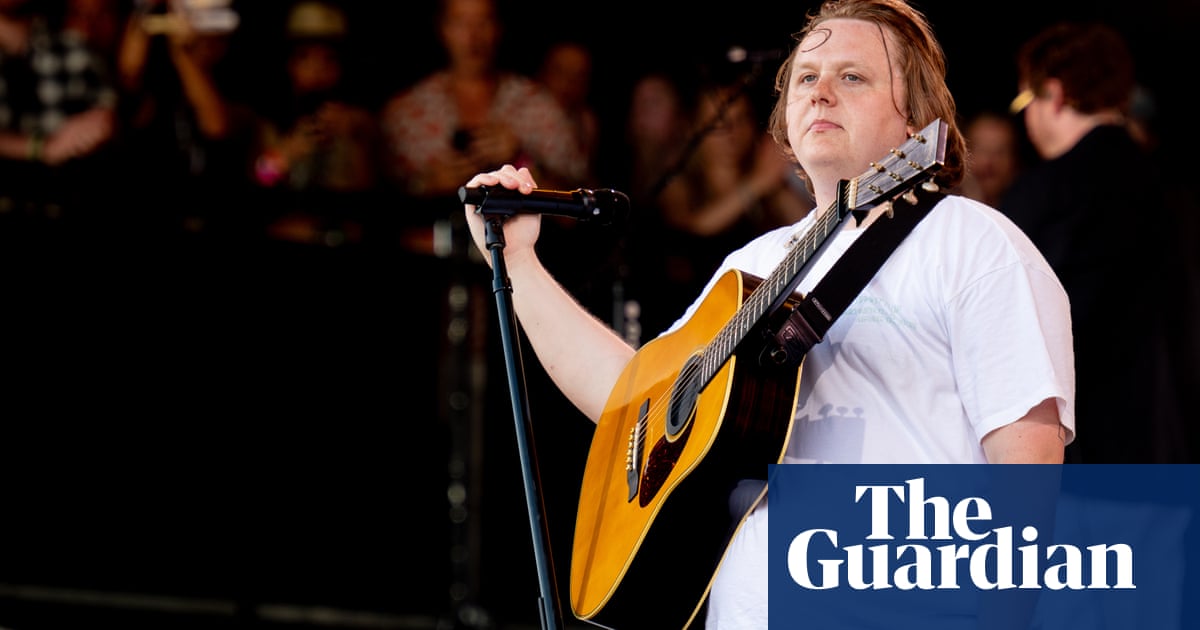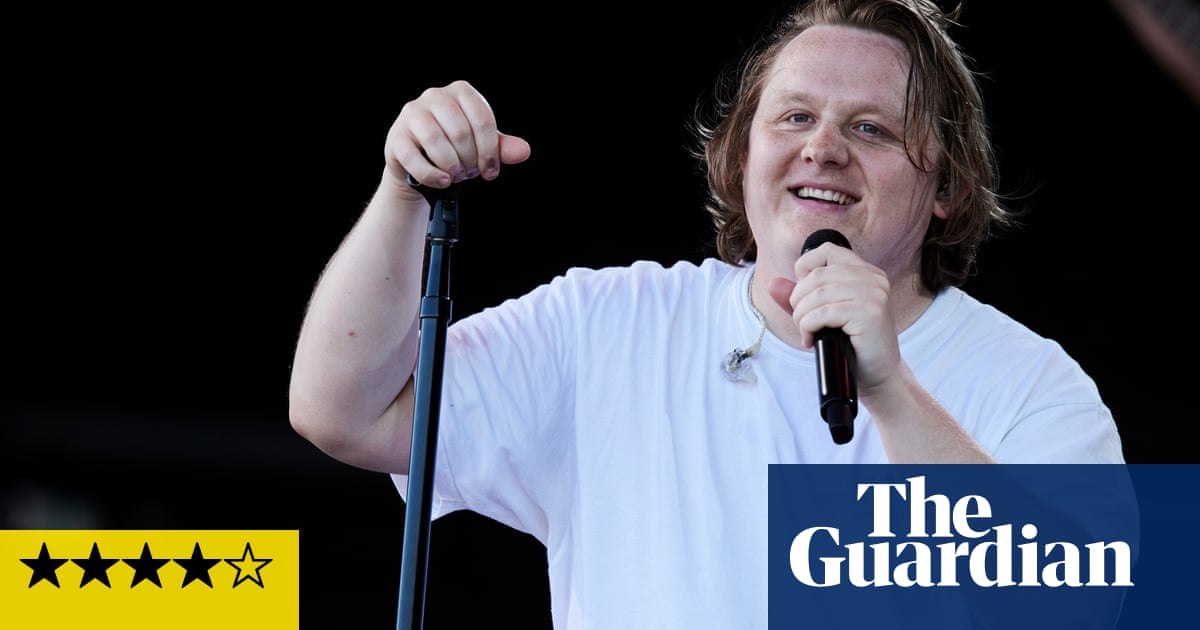
elf-professed punk and anointed voice of a generation Yungblud has done himself a mischief. The day before our interview, while sporting a pair of tight latex shorts, the man born Dominic Harrison attempted a high-kick move from Cardi B and Megan Thee Stallion’s WAP video, pulling his hamstring in the process. It’s not the 23-year-old’s only ailment today, either. Ahead of the release of his second album of anarchy-adjacent pop-rock, Weird!, he’s not been sleeping. It means his oversized energy – think Liam Gallagher via Skins pushed through a TikTok filter – has a certain extra piquancy, not helped by our interview taking place in that strange time between national lockdowns.
“When something important’s going on my mind just runs,” he says in his thick Doncaster accent, before collapsing his lanky frame into a too-small chair in his PR’s central London office. “I’ve got ADHD and I just have a million ideas a minute that just want to get out.”
Despite an impressive 8.6 million monthly listeners on Spotify, Harrison has yet to fully infiltrate the mainstream; his only dents on the UK Top 100 so far have been via collaborations with the likes of his ex-girlfriend Halsey (11 Minutes) and fellow pouty anger merchants Bring Me the Horizon (Obey) – but that’s sort of the point. From the start, Yungblud has, he says, been about “representation for the unrepresented” and creating a safe space for life’s so-called weirdos, a nod to one of his idols, Lady Gaga. His hyperactive songs, careening between bubblegum pop, goth-tinged emo and throat-lacerating rock, read like a checklist of modern pop tropes, tackling everything from mental health (Medication) to sexual fluidity (Cotton Candy) to, like, not listening to your parents (Parents). Earlier this year, London’s Evening Standard called him “the poster boy of Gen Z”, while Dave Grohl has hailed him as the future of rock’n’roll. In Harrison, his fans have found a charismatic leader who can make the most trite of soundbites – at one point today he describes TikTok as “punk as fuck” – sound like a call to arms.
Known for his elaborate attire – at this month’s MTV Europe music awards, where he won the award for best push act (best breakthrough), he performed in a white netball skirt and silver wings while suspended 20ft in the air – today Harrison is relatively dressed down in a crisp white shirt, black leather studded braces and a jaunty beret accented with a “blow me” pin badge. While his red brothel creepers match his hair and his nails, they clash with his trademark pink socks, a sartorial cue adopted by his legion of hardcore fans, the Black Hearts Club, so named after two tattoos that adorn Harrison’s fingers. The relationship between artist and fanbase is symbiotic – “I don’t call them my fans, I call them my family because my connection with them is crazy,” he says earnestly – with Harrison filling his lockdown with fortnightly fan phone calls, livestreamed gigs and a barrage of content shared with his 2.6 million Instagram followers.
“If you know Yungblud, the music is secondary,” Harrison says. “I don’t give a shit about hit records. All I care about is a culture, like the Stone Roses or Green Day had, where I stand on stage and we come together because we’re integral to each other’s lives. That’s what it’s about, connecting to people.” He takes a rare pause, his elasticated, Joker-esque face suddenly looking very serious. “If I don’t do it, I die. If I don’t do it I go back to wanting to kill myself. I know it’s fucked-up that all of us have this codependency, but that’s the way it is. I’m just like them in the way they’re just like me.”
Growing up in Doncaster was both “great and fucking awful”. He was bullied remorselessly, even by his teachers who would single him out for his sartorial choices in front of the class. “I had a lot of friends but in a room full of people I would feel totally alone,” he says. “I had my first suicidal thoughts at 13.” His family – whom he describes as “The Waltons meets Peaky Blinders” – were supportive. “My mum used to dye my hair when I was five and my dad was a guitar dealer so he’d seen it all.” It was a household full of music; his grandad (“a fucking nutcase”) performed with T Rex in the 60s, while his maternal grandmother loved Rod Stewart so much she told Harrison he was her boyfriend. “I was kind of in that sensibility of rock’n’roll my whole life,” he smiles.
One of Weird!’s prettier moments, Love Song, touches on the domestic violence he witnessed growing up. “My parents used to fight a lot and it was dark,” he says slowly. “They’d fight and then be friends an hour later. So my idea of love was so skewed.” Escape came via a primal urge to perform. “It was, like, if I don’t belong in this real world I’m going to build a world to belong in. Because I found Gaga, I found [Marilyn] Manson, I found Oasis. That’s all I wanted. I wanted a culture to belong in. I would watch Vivienne Westwood and I would watch the [Sex] Pistols and I would watch fucking Kate Moss, and I would be, like: ‘I need to go to London.’ I needed to get out.”
The capital came calling via an unexpected route. Having fallen headfirst for ballet, at 16 Harrison enrolled at ArtsEd, an independent performing arts school in Chiswick, west London. The Yungblud origin myth occasionally paints this as a rebellious runaway tale but his parents were supportive, covering his £75-a-week rent for a houseshare. He lived with “a cat lady called Marge who made fucking lasagne every night” and who disapproved of his nightly exploits: “I was out for six days exploring my sexuality, exploring drugs, but she’s ringing me mum going: ‘He’s not been home in days.’” Harrison would find a more willing housemate years later in the shape of Lewis Capaldi. “Every week, me and Lewis would be like: ‘Did you get signed yet?’; ‘No, you?’; ‘No.’ Every week. Just us getting into all sorts of trouble. I think we kept Stella Artois in business for those two years.”
After a spell in the ensemble for Bugsy Malone at the Lyric Hammersmith in 2015, Harrison quit arts school, turned off by its “painting by numbers” approach to creativity. He bounced from audition to audition, band to band, almost appearing on The Voice (he quit after one meeting), before playing Oz in Disney’s teen musical series The Lodge in 2016. “They had me for three seasons but I left after one,” he says. “They knew I was a punk.” His unwillingness to play by the rules is apparently governed by the spirit of Amy Winehouse. “She’s an artist I relate to so much. I could cry every time I speak about her,” he says, his voice cracking. “I feel her just going: ‘Tell the fucking truth.’ Just tell the truth because right now there’s a lack of it.”
It was during a “dark month” in 2017 that Harrison focused fully on music and started Yungblud, so named by his managers because he was their youngest client on their roster. Songs started pouring out quickly: “I had all this anger and I had so many questions about the world.” He says he was initially rejected by the more cynical UK labels – “They were more: ‘Who’s this twat? Is he worth his salt? He’s just a shit Arctic Monkeys,’ which was fair” – so he went to Europe, then the US, and built his fanbase organically via a constant stream of singles and social media content.
His debut album, 2018’s 21st Century Liability, released after he signed to Interscope, fed years’ worth of frustration into a record he describes now as “bratty and angry”. With its artwork of Harrison in a straitjacket, it set the template for Yungblud’s forays into highly stylised “weirdo” cosplay, even when the music tracks closer to Busted than, say, Nirvana. “When people write about me as this person for the outsider, I think that’s very surface-level,” he says. “I’ll admit that it started as that. But it’s so much deeper than that; it’s not a slogan on a billboard.”
He cites new song Mars – about a trans fan he met in Maryland whose family had rejected her – as an example of the power of the culture he’s built up around him. “She brought them to my show and her parents saw other people like her, and they saw the need to be together,” he says. “And they took her for a burger afterwards and accepted her as their daughter. It killed me because something that we’ve done – not me, fuck me – something we’ve done is changing someone’s life. A lot of trans people feel like they’re not real and they’re not heard and that’s bullshit.”
Like Harry Styles and Matty Healy, Harrison has been accused of queerbaiting; using aspects of queer culture in performative ways. He counters that his sexuality “changes every day” and his message has always been “if you’re gay be proud of it, if you’re bisexual be proud and if you don’t know then be proud of that, too”. If he had to define himself, he’s “probably pansexual” but prefers not be labelled. “Just because my past three relationships have been with girls doesn’t mean I didn’t have sex with a guy last night.”
One thing Harrison is certain about is what Yungblud stands for. A vehicle for his frustrations as a teenager, it has quickly become an ever-expanding movement, with the lyrics to Weird! often coming from conversations with fans. “I meet them after every show, and I don’t do that for any other reason than to look them in the eyes and tell them: ‘I am the same as you.’” If Weird! can heal them the way it healed him, then all the better. “I want this album to last 10 years,” he says, leaning forward. “I want it to be Back to Black, Urban Hymns, The Fame. I genuinely think this album will be in people’s lives for ever.”
Sleep, it seems, will have to wait.












